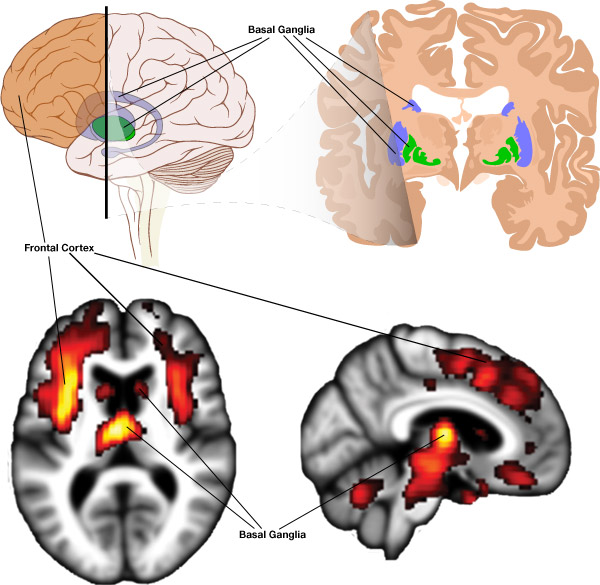Labels: διάγνωση , φλοιοβασική εκφύλιση
UCSF Memory & Aging CenterMRI analysis shows corticobasal degeneration affects the basal ganglia and the frontal cortex the most.
"Mind Matters" Newsletter
Summer 2011
Seeing the Data with New Eyes
The data suggest that it is time to redefine the clinical diagnosis of corticobasal degeneration
Corticobasal degeneration (CBD) is a progressive neurological disorder first described in 1968 by Rebeiz, Richardson and Kolodny. Yet, only recently has there been a systematic effort to reliably diagnose this condition. Nothing can be more discouraging than to have a loved one misdiagnosed during life. Furthermore, it is now known that CBD is caused by abnormal accumulations of the protein tau and, as disease-specific therapies are emerging, getting the right diagnosis has become critically important.
Much to the disappointment of the neurology community, it was recently discovered that nearly two-thirds of the patients diagnosed with CBD during life turned out to have another condition at autopsy. Surprisingly, many of the patients suspected of suffering from CBD had Alzheimer's disease as the underlying cause for their illness. Even more disturbing, patients who truly suffered from CBD were often misdiagnosed with other conditions during including progressive aphasia, frontotemporal dementia, Parkinson's disease or progressive supranuclear palsy.
To address this problem, UCSF Memory and Aging Center researchers reviewed clinical and MRI data in 58 patients who met current clinical criteria for the diagnosis of CBD or suffered pathological criteria for CBD in order to identify the full spectrum of clinical and anatomical features that defined CBD. The results suggested that the symptoms that best predicted CBD were progressive non-fluent aphasia, apathy, disinhibition with poor judgment or problems with leg movement. The MRI finding most suggestive of CBD was tissue loss in the frontal lobes and basal ganglia, not in the parietal lobe as was previously suspected.
This work will soon be published in the prestigious journal Annals of Neurology. New research criteria for CBD are now being formulated, integrating observations from this study and others. Hopefully, some day soon, patients with CBD will receive the correct diagnosis and appropriate therapies.
Μαγνητική τομογραφία που δείχνει πως η Φλοιοβασική Εκφύλιση επηρεάζει κυρίως τα βασικά γάγγλια του εγκεφάλου και τον μετωπιαίο φλοιό.
Πηγή: http://us1.campaign-archive1.com/?u=d9019380fd1207ff3cec24450&id=742c689de9


